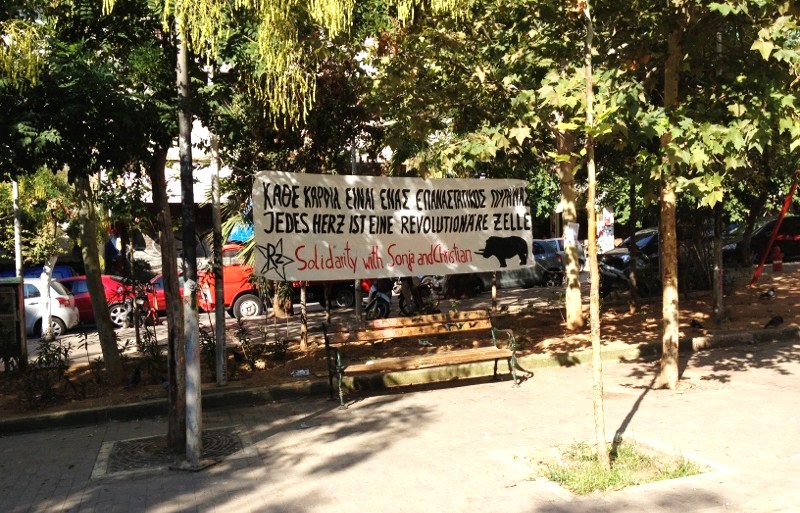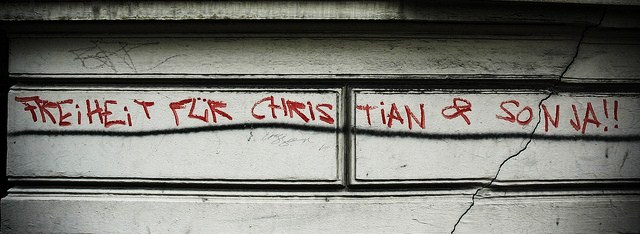 The trial against the two radical leftist fighters is underway in Frankfurt. Both are implicated in actions of the Revolutionary Cells (Revolutionäre Zellen, RZ) against nuclear companies, the racist Apartheid regime and urban renewal in late 70s. The charges against them are based on the one hand on forced ‘testimonies’ of a seriously injured person, who was under drug influence at the time, on the other hand on a key witness, who was already years ago legally classified as untrustworthy. The latter ‘remembered’ after 24 years that Sonja may have been involved in the 1975 action against the conference at the OPEC headquarters.
The trial against the two radical leftist fighters is underway in Frankfurt. Both are implicated in actions of the Revolutionary Cells (Revolutionäre Zellen, RZ) against nuclear companies, the racist Apartheid regime and urban renewal in late 70s. The charges against them are based on the one hand on forced ‘testimonies’ of a seriously injured person, who was under drug influence at the time, on the other hand on a key witness, who was already years ago legally classified as untrustworthy. The latter ‘remembered’ after 24 years that Sonja may have been involved in the 1975 action against the conference at the OPEC headquarters.
Sonja and Christian have been charged with two anti-nuclear attacks conducted by the Revolutionary Cells in 1977. They have also been incriminated for an incendiary attack conducted by the Revolutionary Cells in 1978. Regarding these three charges, the prosecution relies on a statement of Hermann Feiling, fabricated under conditions akin to torture. In the summer of 1978 an explosive device (purportedly destined for another action of the Revolutionary Cells in Munich) had detonated on Hermann’s knees, causing him extensive injuries. He is severely disabled ever since. Under the influence of potent pain killers and sedatives, he was hospitalized and later held in police custody under complete isolation. State Security officers, prosecutors and examining judges who took copious notes were his sole ‘persons of contact’. When Hermann finally escaped isolation, he rejected those ‘testimonies’ as forged and not his own.
After being fugitives for 22 whole years, Sonja and Christian were arrested in Paris in 2000. In the meantime, another charge was added: government witness Hans-Joachim Klein (former member of the Revolutionary Cells) suddenly claimed to remember that Sonja Suder transported weapons to Vienna in 1975 for an attack against the OPEC oil ministers’ conference. Frankfurt district court rejected Klein’s testimony against Sonja and others as non-credible in his 2000 trial (and yet, his allegations are being repeated in the 2012 charges against Sonja). A French court rejected the extradition request back then, and after posting bail of a few hundred euros, both were allowed to remain in France. However, German prosecutors submitted a ‘European’ arrest warrant against the two fighters in 2007, and the French authorities agreed to it in 2010.
After 33 years in exile in France, in September 2011 Sonja Suder (79) and Christian Gauger (71) were extradited to Germany and delivered to justice. Sonia was imprisoned, while Christian became hostage outside the walls, under restrictive terms. Both have repeatedly denied any cooperation with the German ‘State Security’.
Now that the first six days of trial against Sonja and Christian elapsed, it just turns out to be—as expected—a premeditated political condemnation of both defendants and the militant past of autonomous groups which fought against nuclear energy, gentrification and state terrorism in the 70s in Germany and beyond.
Day by day, the constructed indictment is proved to be a vengeful farce. Also, the defense lawyers feel certain that the judges have made their decision on the defendants’ guilt, given that the court accepted such an accusatory brief in the first place. Hence, even before the trial started, the defense had filed a motion for rejection of the present judges on grounds of bias.
Sonja and Christian deserve international and unconditional solidarity for having refused any cooperation with the authorities since years. Even if it means facing long-term imprisonment and difficult living conditions, they stick to their consistent refusal to give a confession.

First trial session
On Friday, September 21st, 2012 the trial against Sonja Suder and Christian Gauger began at 9am in a small high-security hall of the Frankfurt Federal Court.
Previously, a rally was held in front of the courthouse with nearly 100 participants. There were speeches, music and ‘solidarity balloons’ that ascended into the sky, wishing freedom and happiness to both accused. Solidaritarians—among them activists from France who fought for many years against the extradition of the two comrades—carried banners and chanted slogans to protest this method of political justice that the German State represents.
When Sonja and Christian entered confidently the courtroom, sustained applause rang out from the audience. All 70 seats were occupied; many had to wait outside due to the lack of space. A glass panel separated the spectators from the comrades.
When the presiding judge called on the defendants, their counsels intervened with a second motion for disqualification of the judges for bias, on the basis of unlawfully obtained statements from the severely injured Hermann Feiling and the unreliable witness Hans-Joachim Klein.
During the next day of trial, the bench rejected the aforementioned motions of the defense, saying that the legal argumentation has not yet started.
Judicial scandals accompany the trial
Since the very beginning, the court proceeding has been quite tenacious. Sessions were frequently interrupted by the bench for secret discussions. Applications were pre-examined and each process was planned beforehand.
The third day of trial was interrupted because disabled persons in wheelchairs did not have access and the microphone was not even working.
On the fourth day of trial Hermann Feiling was called to testify. His lawyer explained that Feiling would not appear. He presented a medical certificate, which explains his enormous risk for seizures in stressful situations. Thus, the witness could not be examined in person because of post-traumatic stress disorder. The prosecution—in fear of losing a central column of the charges—asked the lawyer desperately about the bomb’s origin. In that moment the defense finally intervened, since this questioning was as much speculative as the charges of this political case.
On the fifth day of the trial the witness S. was called to testify and entered the courtroom. Her counsel requested to testify legally in behalf of his client, and declared that she had accepted her former conviction in 1982, based on alleged testimonies by Hermann Feiling, only because she wanted Feiling to avoid further prosecution. She still strongly believes that he was in no condition to undergo interrogation and intends to appeal her case.
The prosecutor demanded the witness’s testimony. The defense raised an objection and stated that S. must not testify in court, since she seeks a revision of her own case due to the inadmissible interrogation of Feiling. Unsurprisingly, the court went along with the prosecutor’s perception and rejected the counsel’s application for refusal to testify. The witness insisted on her decision. Due to her refusal, the presiding judge threatened her with a monetary fine and coercive detention* that can lead up to half a year. The witness, however, maintained a firm position.
The prosecution demanded a fine of 800 euros (or, alternatively, eight days’ imprisonment) as well as her coercive detention, deeming S. ‘a perpetrator by conviction’. The witness’s lawyer argued that Feiling’s statement should not have been used and taken into consideration even in his client’s case. He and the defense lawyers, who work independently from each other, clearly agree that Feiling’s forged testimonies cannot be valid in any court. Nevertheless, the judge refused to consult an expert witness and tried to proceed with the examination of the so-called ‘testimonies’ by Hermann.
This situation became unbearable for some spectators. Part of the audience left the courtroom protesting loudly. The judge pointed at one spectator and requested an identification check. She interrupted the trial. About ten minutes later, the police arrived and asked a woman spectator to follow them. After she refused and asked to know why, a plainclothes cop took her and forcibly pushed her out of the room. People from the audience complained about the oppressive measures, but the cops enforced the identification check anyway, amid an aggressive mood and constant tension.
The condition of Sonja and Christian
Christian’s health condition has been deteriorating for some days now. The sixth day of trial was cancelled due to his sickness (while the hearing of October 19th was rescheduled as well). One of his friends commented that Christian suffers a lot from the court proceeding and the associated stress.
Despite all this, Sonja seems to be in a good health condition. In particular, she looked very happy when she saw friends from France. Supporters give her noticeable strength to remain faithful to her ideals and withstand this farce, which is followed by sensationalist media, too. When Sonja entered the courtroom that day, a photojournalist was insisting on taking her picture. Even though the lawyer asked him to keep his distance, this idiot with his camera did not leave her alone, so Sonja had to hide behind her counsel’s back for some minutes to avoid the reporter.
The trial was adjourned to October 30th.
Fuck the farce trial! Freedom for Christian and Sonja!
Strength and solidarity from every revolutionary cell in our hearts!

For more information and updates, follow the blog of comrades who monitor this trial (in German) — kontakt[aet]verdammtlangquer.org
* Beugehaft: coercive detention or imprisonment for contempt, applied with the purpose to force people to do something against their will, for example to pay a fine or to answer interrogating questions concerning a third person.
